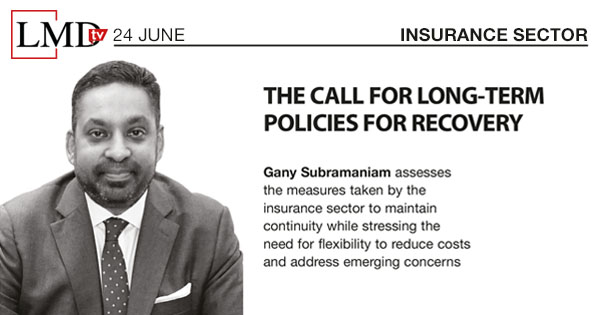The insurance sector has experienced challenging times in recent months as a result of its ties to various economic activities, noted the Chief Executive Officer of Allianz Insurance Lanka Gany Subramaniam.
He explained: “As with any other sector, insurance is tied to activities such as importing vehicles, exporting manufactured products, and even people travelling and dining out.”
While acknowledging that being unable to meet customers will continue to pose a challenge for the sector, Subramaniam said he looked forward to business prospects being more positive, highlighting heightened customer awareness of the need for life and health insurance products as a potential driving force.
Commenting on the various approaches that players in the insurance sector have adopted to adapt to the new business scenario, he observed that the concept of digitalisation has become more prominent than could have been anticipated.
“A question that arose was if face-to-face meetings would continue to be the best way to sell policies in the new norm or if we could employ social media apps and other platforms, such as Zoom, WebEx products and Microsoft Teams,” he remarked.
Elaborating on this, he cited instances in other countries where businesses have been more flexible in terms of how sales can be pursued: “With the appropriate controls, technology and IT security, remote selling is a possibility, which I believe will take place.”
In addition to these changes, Subramaniam outlined his expectation of corporates in the banking and insurance sectors to review their business models as many are founded on sizable bricks and mortar footprints.
“This is an idea that may spread in Sri Lanka,” he opined, adding: “While there have been discussions about implementing flexible working hours for years, cultural barriers persisted with uncertainty about whether people could be trusted to work from home.”
Despite these concerns, he noted that certain business functions have been more efficient, leading to debates as to whether there would be a need for employees to travel to and from offices.
With the unprecedented nature of the pandemic, there has been a rise in concerns regarding health and safety among the general public. As for how this could be addressed by what the insurance sector offers, Subramaniam believed that new products would be introduced to address the concerns of individuals rather than corporates.
“As with any insurance product, there is a need to identify the relevant exposure and frequency of occurrence, as well as the extent of the damage before arriving at a rate,” he said, stressing that “the work must be done when it comes to assessing the appropriate rates and levels of coverage.”
As for whether or not vaccinations should be covered, he stated that while there are limits to insurance policies, there is a logical basis for including treatment when illnesses are covered.
When it comes to implementing policies to support the insurance sector’s recovery, Subramaniam remarked that these would be complex decisions for governments in any country in the prevailing climate.
“Broadly speaking, government policies must be consistent with a long-term view when being introduced as short-term policies tend to be more disruptive,” he explained.
Furthermore, he called for a review of longstanding labour policies in the face of an inevitable economic downturn, noting that current regulations are rigid.
“For many businesses, the cost of the staff component could exceed 30 or 40 percent – especially in the service sector,” Subramaniam asserted, stating that “along with the associated costs of rentals, housing and so on, expenditure would be quite high and flexibility is needed to continue securing employment.”
Summarising his views, he stated: “A major challenge will be managing the long-term impacts of these costs and businesses must remain strong regardless of their size as they all provide employment.”




